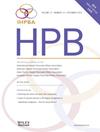“肥胖悖论”作为胰腺癌患者长期幸存者的新见解。
IF 2.4
3区 医学
Q2 GASTROENTEROLOGY & HEPATOLOGY
引用次数: 0
摘要
背景:肥胖通常与不良预后相关。然而,最近出现的“肥胖悖论”概念表明,肥胖癌症患者比非肥胖患者生存率更高。虽然这种现象已在几种癌症中得到证实,但其与胰腺癌的相关性尚不清楚。本回顾性研究探讨肥胖悖论是否适用于胰腺切除术后的胰腺癌(PC)。方法:对2004 ~ 2022年间行手术治疗的404例PC患者进行研究。结果:肥胖患者的5年总生存率(p = 0.040)和肿瘤特异性生存率(p = 0.047)明显优于非肥胖患者。在肥胖队列中,较低的VSR与生存率的提高相关(p = 0.012),表明脂肪分布在结果中的重要性。结论:肥胖与PC患者的生存率提高有关,强调了采用细致入微的方法管理肥胖患者的潜在益处。脂肪组织的分布,特别是相对于内脏脂肪的皮下脂肪,进一步影响生存,表明量身定制的治疗策略可能改善结果。本文章由计算机程序翻译,如有差异,请以英文原文为准。
“Obesity Paradox” as a new insight from long-term survivors in pancreatic cancer patients
Background
Obesity is traditionally associated with poor outcomes. However, the recently emerging concept of the “obesity paradox” suggests that obese cancer patients have better survival rates than non-obese patients. While this phenomenon has been confirmed in several cancers, its relevance to pancreatic cancer remains unclear. This retrospective study explores whether the obesity paradox applies to pancreatic cancer (PC) after pancreatectomy.
Methods
A total of 404 PC patients who underwent surgery between 2004 and 2022 were studied. Patients were classified into the non-obese (BMI <25.0) (n = 313) and obese (BMI ≥25.0) (n = 91) groups. A subgroup analysis examined the impact of the visceral fat to subcutaneous fat ratio (VSR) on survival within the obese cohort.
Results
Obese patients had a significantly better 5-year overall survival (p = 0.040) and cancer-specific survival (p = 0.047) than non-obese patients. Within the obese cohort, a lower VSR was associated with improved survival (p = 0.012), indicating the importance of fat distribution in outcomes.
Conclusion
Obesity is associated with improved survival in patients with PC, highlighting the potential benefits of a nuanced approach to manageing obese patients. Distribution of adipose tissue, particularly subcutaneous fat relative to visceral fat, further influences survival, suggesting that tailored treatment strategies may improve outcomes.
求助全文
通过发布文献求助,成功后即可免费获取论文全文。
去求助
来源期刊

Hpb
GASTROENTEROLOGY & HEPATOLOGY-SURGERY
CiteScore
5.60
自引率
3.40%
发文量
244
审稿时长
57 days
期刊介绍:
HPB is an international forum for clinical, scientific and educational communication.
Twelve issues a year bring the reader leading articles, expert reviews, original articles, images, editorials, and reader correspondence encompassing all aspects of benign and malignant hepatobiliary disease and its management. HPB features relevant aspects of clinical and translational research and practice.
Specific areas of interest include HPB diseases encountered globally by clinical practitioners in this specialist field of gastrointestinal surgery. The journal addresses the challenges faced in the management of cancer involving the liver, biliary system and pancreas. While surgical oncology represents a large part of HPB practice, submission of manuscripts relating to liver and pancreas transplantation, the treatment of benign conditions such as acute and chronic pancreatitis, and those relating to hepatobiliary infection and inflammation are also welcomed. There will be a focus on developing a multidisciplinary approach to diagnosis and treatment with endoscopic and laparoscopic approaches, radiological interventions and surgical techniques being strongly represented. HPB welcomes submission of manuscripts in all these areas and in scientific focused research that has clear clinical relevance to HPB surgical practice.
HPB aims to help its readers - surgeons, physicians, radiologists and basic scientists - to develop their knowledge and practice. HPB will be of interest to specialists involved in the management of hepatobiliary and pancreatic disease however will also inform those working in related fields.
Abstracted and Indexed in:
MEDLINE®
EMBASE
PubMed
Science Citation Index Expanded
Academic Search (EBSCO)
HPB is owned by the International Hepato-Pancreato-Biliary Association (IHPBA) and is also the official Journal of the American Hepato-Pancreato-Biliary Association (AHPBA), the Asian-Pacific Hepato Pancreatic Biliary Association (A-PHPBA) and the European-African Hepato-Pancreatic Biliary Association (E-AHPBA).
 求助内容:
求助内容: 应助结果提醒方式:
应助结果提醒方式:


